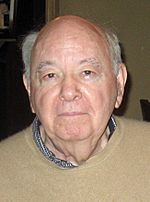Owen Webster facts for kids
Quick facts for kids
Owen Wright Webster
|
|
|---|---|

Owen Webster in 2010
|
|
| Born | March 25, 1929 Devil's Lake, ND
|
| Died | April 13, 2018 (aged 89) |
| Nationality | USA |
| Alma mater | Pennsylvania State University |
| Scientific career | |
| Fields | Chemistry |
| Institutions | DuPont |
Owen Wright Webster (March 25, 1929 – April 13, 2018) was a brilliant American chemist. He made important discoveries in how to create new materials. His work helped make things like the ink used in ink-jet printers today.
Owen Webster was born on March 25, 1929, in Devils Lake, North Dakota. He studied at the University of North Dakota, earning his first degree in 1951. Later, he received his Ph.D. in organic chemistry from Pennsylvania State University in 1955.
After finishing his studies, Webster joined the DuPont company. He worked there for his entire career. He also taught chemistry as a professor at the University of Alabama and the University of Pennsylvania.
Contents
Making New Chemicals
Webster's early work at DuPont focused on making new kinds of chemicals. These chemicals were called "cyanocarbons." He discovered many new compounds with special properties. For example, some of his discoveries were very strong acids. Others could react in unique ways with other chemicals. This research helped expand our understanding of how chemicals can be put together.
Innovations in Polymers
Later in his career, Webster switched to studying polymer chemistry. Polymers are large molecules made of many smaller repeating units. Plastics are a common type of polymer.
Group Transfer Polymerization
One of his most important inventions was called Group Transfer Polymerization (GTP). This was a new way to control how polymers are built. It allowed chemists to create polymers with very specific structures. DuPont uses this technology to make special inks for ink-jet printers. This invention led to a huge business for the company.
Other Polymer Discoveries
Webster also developed other new ways to make polymers. He worked on "living cationic polymerization" for vinyl ethers. These discoveries inspired many other scientists to research controlled polymerization. He also introduced the idea of "hyperbranched polymers." These are special polymers that branch out like trees. His work helped create new materials with unique features.
Awards and Recognition
Owen Webster's amazing work in chemistry earned him many honors. In 1993, he received a major award from the American Chemical Society. This award recognized his contributions to applied polymer science.
He was also named a "DuPont Fellow," which is a very high honor within the company. Just before he retired, DuPont gave him their highest technical award, the Lavoisier Medal.
- 1993 American Chemical Society award for Applied Polymer Science
- 1995 Chemical Pioneer Award from the American Institute of Chemists
- 1996 Lavoisier Medal from DuPont
 | DeHart Hubbard |
 | Wilma Rudolph |
 | Jesse Owens |
 | Jackie Joyner-Kersee |
 | Major Taylor |

